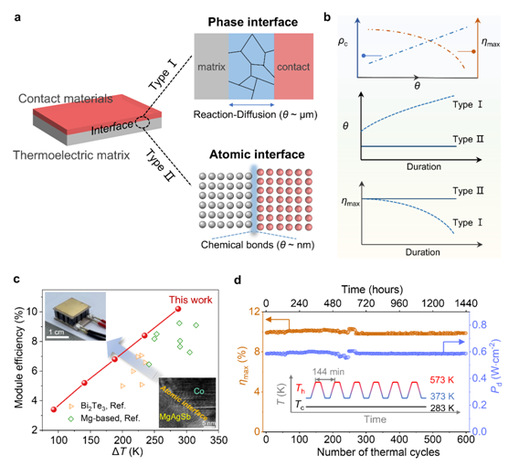Recently, a research team from DHU successfully developed a fully magnesium-based, highly efficient, and stable thermoelectric device composed of p-type MgAgSb and n-type Mg3(Sb,Bi)2. After operating for 1440 hours within the temperature range from near room temperature to 573K, the device’s performance remained stable, overcoming the traditional bottleneck of interface failure in thermoelectric devices. This provides a new approach to developing high-performance, long-lifespan thermoelectric devices. The related research, titled “Atomic-scale interface strengthening unlocks efficient and durable Mg-based thermoelectric devices,” was published in Nature Materials. The paper’s corresponding authors include Professor Jiang Guan and Professor Wang Lianjun from our Advanced Fiber Materials National Key Laboratory and the College of Materials Science and Engineering, Professor Zhang Qihao from the Functional Materials Research Center, and Researcher Xu Fangfang from the Shanghai Institute of Ceramics, Chinese Academy of Sciences. The first author is Zuo Wusheng, a doctoral student from the 2021 cohort of the School of Materials Science and Engineering. Co-first authors are Professor Chen Hongyi from Central South University, Dr. Yu Ziyi from the Shanghai Institute of Ceramics, Chinese Academy of Sciences, and doctoral student Fu Yuntian from the 2020 cohort of the School of Materials Science and Engineering. This research was supported by the National Natural Science Foundation of China, the Shanghai Municipal Education Commission Innovation Program, and the Shanghai Science and Technology Commission.

Solid-state thermoelectric technology presents a compelling solution for converting waste heat into electrical energy. However, its widespread application is hindered by long-term stability issues, particularly at the electrode–thermoelectric material interface. Here we address this challenge by constructing an atomic-scale direct bonding interface. By forming robust chemical bonds between Co and Sb atoms, we develop MgAgSb/Co thermoelectric junctions with a low interfacial resistivity (2.5 µΩ cm2), high bonding strength (60.6 MPa) and high thermal stability at 573 K. This thermally stable and ohmic contact interface enables MgAgSb-based thermoelectric modules to achieve a conversion efficiency of 10.2% at a temperature difference of 287 K and to exhibit negligible degradation over 1,440 h of thermal cycling. Our findings underscore the critical role of atomic-scale interface engineering in advancing thermoelectric semiconductor devices, enabling more efficient and durable thermoelectric modules.

This study proposes an innovative atomic-scale interface strengthening strategy combined with high-throughput screening technology, successfully achieving highly efficient and stable fully magnesium-based thermoelectric devices. This breakthrough not only advances the development of magnesium-based thermoelectric materials and devices but also holds significant scientific and practical value for the progress of clean energy technologies, laying a solid foundation for the industrialization and commercialization of future thermoelectric devices.
